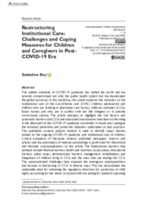Abstract
The sudden outbreak of COVID-19 pandemic has rattled the world and has severely compromised not only the public health system but has decelerated the global economy. In this backdrop, the article explores the dynamics of the institutional care of the out-of-home care (OHC) children, adolescents and children who are residing in alternative care homes, childcare institutes (CCIs), foster homes and who are in conflict with law like refugees or in juvenile correctional centres. The article attempts to highlight the risk factors and systematic barriers that CCIs and associated functionaries have been confronting in the aftermath of the COVID-19 pandemic worldwide. It would also catalogue the remedial, preventive and protective initiatives undertaken as best practices. The qualitative content analysis method is used to identify major themes related to the ongoing COVID-19 pandemic and institutional care of children. Critical evaluation of literature reviews, published newspaper reports and articles and documentation of webinar proceedings is performed for theoretical and thematic conceptualisation of this article. The fundamental barriers that surfaced include financial barriers, health and nutrition, social justice, educational barriers, safety issues, administrative barriers, management, rehabilitation and integration of children living in CCIs and the ones who are leaving the CCIs. The unprecedented challenges have exposed the emergency unpreparedness and lacunae in functioning of CCIs in diverse ways. This has necessitated the undeniable need for reframing the regulatory directives for protection of child rights; accounting for the newer structural reforms aiming for standard operating procedures (SOPs); compliance and accountability guidelines; upgrading training and capacity building of the caregivers; addressing issues of psycho-social, mental health and well-being of the children and caregivers; building resilient coping strategies and enhancing the dignity, flexibility, inclusivity and sustainability in the responsive policy formulation regarding overall childcare system. This entails a multi-sectoral, participatory and coordinated approach as envisaged in United Nations Convention on the Rights of the Child (UNCRC) where the concerned stakeholders, including government legislations, non-governmental organisations (NGOs), civil societies, grassroot organisations, individual CCIs and management staff, would ensure non-discriminatory measures protecting the best interests of the children.

